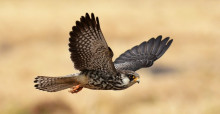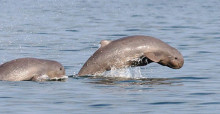Hírek a nagyvilágból
 >
>
New Chair and Vice-Chair of the CMS Scientific Council and its Sessional Committee
As announced in Notification 2020/017 the elections for the posts of Chair and Vice-Chair of the CMS Scientific Council and its Sessional Committee have taken place. The successful candidates are Narelle Montgomery of Australia, who is the new Chair, and Daniel Fernando of Sri Lanka, who is the new Vice-Chair. Narelle has worked on wildlife issues for the Australian Government for over 25 years, and attended her first CMS COP in 1999, when COP6 was held in Cape Town, South Africa.
2020/017: Election of the Chair and Vice-Chair of the Scientific Council and its Sessional Committee
From Prey to Protected Species: How the Tide Turned for the Amur Falcon
In October each year, communities in the mountainous parts of Northeast India, gather in anticipation of the arrival of a small grey bird, the Amur Falcon, which annually migrates over 30,000 km.
Fehmarnbelt-Tunnel kann kommen - MV könnte Nachsehen haben
Der umstrittene Fehmarnbelt-Tunnel kann gebaut werden
2020/016: New Party to the Convention - Turkmenistan
IPBES Launches New Report on Biodiversity and Pandemics
The report of a workshop on the links between the degradation of nature and increasing risk of pandemics has just been released. The workshop was convened by the Intergovernmental Science-Policy Platform on Biodiversity and Ecosystem Services (IPBES) with the participation of 22 leading experts from around the world. The experts conclude that it will be possible to minimize the risks of future pandemics, but a seismic shift in approach from reaction to prevention will be required.
South Andean Huemul Recorded in Northern Patagonia
A bilateral project funded in the Rio Puelo River Basin of northern Patagonia has confirmed the presence of groups of endangered Huemul or South Andean Deer (Hippocamelus bisulcus) in two sites - Lago Azul and Las Horquetas - Los Patos, part of a cross-border population shared by Argentina and Chile.
2020/015 Electronic Voting of the IUCN Motion on Ecological Connectivity
Statement - The COVID-19 Challenge: Zoonotic Diseases and Wildlife
In response to the COVID-19 pandemic, the Collaborative Partnership on Sustainable Wildlife Management (CPW), of which the CMS Secretariat is a member, has issued a statement: “The COVID-19 Challenge: Zoonotic Diseases and Wildlife”. The statement outlines four guiding principles to reduce the risk of animal diseases that can spread between animals and humans. The principles aim to reduce the risk of future pandemics originating from wild animals, strengthening wildlife conservation and respecting livelihoods, food security and culture.
CMS to Join the Second Phase of CounterMEASURE to Investigate Impact of Plastic Pollution on Migratory Species
The CMS Secretariat will be working with CounterMEASURE to investigate the impact of plastic on migratory species in Asian River Basins. CounterMEASURE’s first phase helped fill gaps in knowledge on the origins of plastic pollution in Asian rivers. In its the second phase, the project is also turning its attention to the impacts of this plastic pollution – particularly on wildlife.






